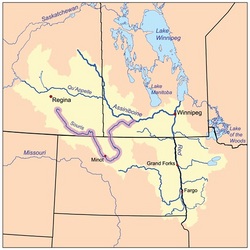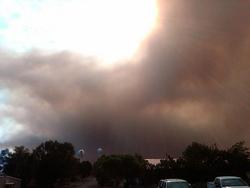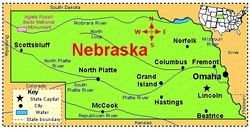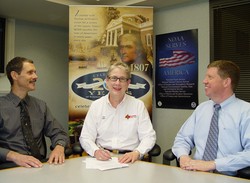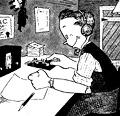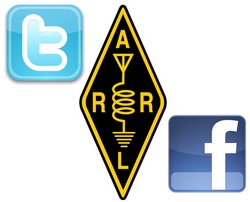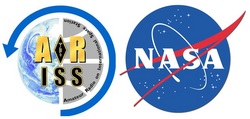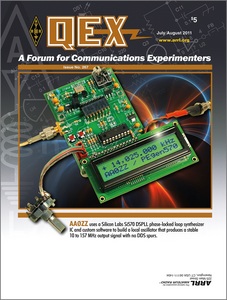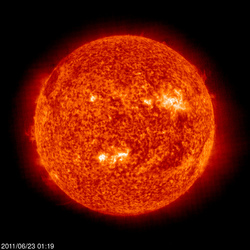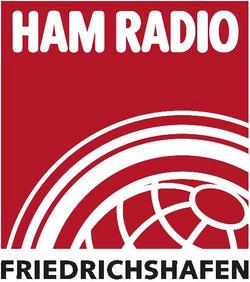 June 23, 2011 John E. Ross, KD8IDJ, Editor
| ||||||||||||||
+ Available on ARRL Audio News + Public Service: North Dakota Hams Brace for Flooding River
As the Mouse River -- or Souris River -- rises, residents in Minot, North Dakota, are under orders to immediately evacuate their homes. The river -- which originates south of Regina, Saskatchewan, flows through North Dakota and then heads north where it terminates in Manitoba -- has already started to flow into the streets of Minot. "We have activated the North Dakota ARES® and RACES groups for support as of today, June 22 at 12 noon (CDT)," said North Dakota Section Manager Lynn Nelson, W0ND. "The mandatory evacuation is immediate and some 11,000 homeowners are told to leave now! The Mouse River is overflowing the dikes and officials are planning on blowing the sirens shortly." Read more here. Public Service: Amateur Radio Operators Provide Support for Arizona/New Mexico Wildfires
The Wallow Fire, which began in Eastern Arizona on May 29, burned across the state line into New Mexico on June 11. On Sunday, high winds and low humidity helped the half-million acre fire to easily jump its containment lines. According to Charlie Christmann, K5CEC, New Mexico Amateur Radio operators are near the fire lines, providing updates to the State Emergency Operations Center via the MegaLink repeater system. Read more here. + Public Service: Nebraska Hams Needed to Provide Access to 911 Services When 23,000 people in Lincoln, Nebraska lost their digital phone service on the morning of June 22, local Amateur Radio operators were called in to help provide local residents with a connection to the 911 dispatchers. According to ARRL Nebraska Section Manager Art Zygielbaum, K0AIZ, those trying to call 911 via the digital phone system to report emergencies were met with a recording that said "Due to network difficulties, your call cannot go through."
"Lancaster County [Nebraska] Emergency Manager Doug Ahlberg activated ARES® because Time Warner Cable lost a significant portion of its digital phone service," Zygielbaum explained. "More than 30 ARES® members were deployed along major roads throughout Lincoln and at major intersections to help people who might need emergency services. The outage lasted close to 12 hours." According to the Lincoln Journal Star, the digital phone service was working early Wednesday evening on a "rolling restoration" of 911 service. Time Warner said earlier its 10-digit calling issues were fixed. This is the second time in 16 months that radio amateurs have been asked to provide support due to 911 service disruptions in Nebraska. In April 2010, almost 40,000 people -- including Lincoln's government, business and emergency centers -- found out that they had no landline telephone service, as well as spotty cell phone coverage, thanks to an equipment malfunction at a Lincoln switching facility owned by Windstream Communications. According to news reports, residents of 12 counties were unable to contact 911 and dispatch centers used local radio amateurs to help provide communications support. + Public Service: ARRL, National Weather Service Update Memorandum of Understanding
The National Weather Service (NWS) has updated its Memorandum of Understanding (MoU) with the ARRL. The updated MoU serves "as a framework within which volunteers of the ARRL may coordinate their services, facilities and equipment with the NWS in support of nationwide, state and local early weather warning and emergency communications function." In May, ARRL President Kay Craigie, N3KN, signed on behalf of the ARRL, and in June, NWS Office of Climate, Water and Weather Services' Director Dave Caldwell signed on behalf of the NWS. The ARRL and the NWS have had a formal working arrangement since 1986. Read more here. ARRL Field Day: W1AW Announces 2011 Field Day Bulletin Schedule
Stations active during ARRL Field Day -- June 25-26 -- are eligible to receive 100 bonus points for copying the special Field Day bulletin transmitted by W1AW (or K6KPH on the West Coast) according to the schedule below. You must include an accurate copy of the message in your Field Day submission. The Field Day bulletin must be copied via Amateur Radio; it will not be included in Internet bulletins sent out from Headquarters and will not be posted to Internet BBS sites. Read more here. ARRL Field Day: Get Active on Social Media for ARRL Field Day
The ARRL is encouraging hams to use social media sites, such as Facebook and Twitter, to promote their Field Day activities. ARRL Field Day begins at 1800 UTC on Saturday, June 25 and ARRL Media and Public Relations Manager Allen Pitts, W1AGP, would like hams to use Twitter to send a tweet announcing their Field Day activities two hours before the event begins: "We would like everyone to get on Twitter at 1600 UTC and send 'Meet me at Field Day at [your location] #ARRL #hamradio.' You can also re-tweet the messages of others. As Field Day progresses, continue to tweet, post status updates on Facebook and add pictures of your Field Day activities." You can follow the ARRL's Field Day activities on Facebook and Twitter. W1AW Station Manager Joe Carcia, NJ1Q, will be posting updates from W1AW on the ARRL's Facebook page and on the W1AW Twitter account. You can also follow along on the ARRL's youth Twitter account and its Public Relations Twitter account. ARRL Field Day: International Space Station Could Be Active for ARRL Field Day
According to NASA ISS Ham Radio Project Engineer Kenneth Ransom, N5VHO, the crew on board the International Space Station (ISS) could very well be on the air for ARRL Field Day, June 25-26. "The ISS will be supporting ARRL Field Day as long as mission events permit," Ransom told the ARRL. "The crew will activate one of the automatic modes (crossband or packet digipeater) to allow ground stations to use the ISS as a relay." Ransom said that the crew may also be available to support direct contacts: "The crew could operate either or both call signs -- RS0ISS and NA1SS -- and would send '2 Alpha DX.' Listen for them on the downlinks of 145.80 and/or 437.55 MHz." Read more here. + Amateur Radio in Space: NASA Astronauts and Astronaut Candidates Earn Amateur Radio Licenses Every few years, NASA selects women and men to join its astronaut training program. Out of the hundreds who apply, only a select few are chosen to become Astronaut Candidates. Their training runs for at least two years, and when it is over, the Astronaut Candidates become full-fledged astronauts and are assigned to upcoming missions. Part of the training is an optional Amateur Radio licensing class. Once licensed and in space, these astronauts can use Amateur Radio to communicate with people here on Earth.
According to ARRL ARISS Program Manager Rosalie White, K1STO, the latest cycle of classes is almost over. "During the week of June 6-12, Nick Lance, KC5KBO, presented a series of Amateur Radio license class lessons to seven NASA Astronaut Candidates who elected to take part in future ARISS educational activities," she said. "Following the classes, Nick conducted a license exam session on June 13 for those Astronaut Candidates who felt they were ready. On June 17, the FCC issued Technician class call signs to three Astronauts: Takuya Onishi, KF5LKS, Gregory Wiseman, KF5LKT, and Jeremy Hansen, KF5LKU. More Astronaut Candidates have expressed a desire to take the exam in the near future." White said that on June 9, Astronaut Michael Hopkins, who studied on his own, passed his Technician exam as well. The FCC issued his new call sign, KF5LJG, on June 14. His future NASA assignment is Expedition 37 in 2013 on the International Space Station. Additionally, Astronaut Kjell Lindgren, KO5MOS, upgraded from the Technician to General. "The ARISS Team is thrilled to see such great interest on the part of the Astronauts and Astronaut Candidates who are looking forward to supporting Amateur Radio educational activities through the ARISS platform, White said. Kudos to the ARISS Houston contingent who continues to help increase the number of astronauts who are Amateur Radio operators!" ARRL Hosts RFI Workshop for Utility Companies On June 16-17, the ARRL hosted an RFI workshop for utility company employees. Led by Mike Martin, K3RFI, owner of RFI Services, the workshop was geared for those technicians, linemen and engineers who are responsible for solving RFI and TVI problems. Four participants from around the country made their way to Newington to take part in classroom and field instruction to learn how to best locate and solve these interference problems. Read more here. + At the Workbench: Homebrew Challenge Reminder The ARRL has sponsored two Homebrew Challenges in the past, designed to test our members' design and construction skills by making useful amateur gear at low cost -- and sharing their results with our members. Our first ARRL Homebrew Challenge, announced in QST for August 2006, required the construction of a 40 meter, 5 W voice and CW transceiver built for less than $50 of new parts. The Second Homebrew Challenge, announced in February 2009, resulted in a number of creative designs of low cost 50 W linear amplifiers to follow the transceiver -- two for about $30, as well as a multiband amplifier with many features for somewhat more. For 2011, the ARRL has issued a challenge to build a transceiver in celebration of the (slow) return of sunspots. This challenge will be in two parts and hams can enter either or both options:
Instead of challenging entrants to make the transceiver at the lowest cost, the ARRL will instead challenge builders to provide the highest quality, best performance and most features within the cost target of $150 for Option 1 and $200 for Option 2. In addition to the cash prize, the winners of these challenges will have articles describing their designs in QST and will receive the usual page rate for the published articles. Additional entrants who meet the minimum requirements -- and have interesting design features -- may also be considered for QST or ARRL Web articles. Entries for either option must be received at ARRL Headquarters no later than November 1, 2011. To be considered, each entrant must submit a working transceiver that is suitable for testing in the ARRL Lab and for on-the-air judging by the ARRL staff judges. Documentation required includes a priced parts list indicating the source and purchase price of each part, an article draft including a design description, construction hints, alignment instruction, block diagrams and schematic diagrams. Photographs may be provided, but final magazine photos will be taken by ARRL staff. For more information, including specific requirements and evaluation criteria, please visit the ARRL Homebrew Challenge web page. QEX -- the July/August 2011 Issue
The July/August issue of QEX is coming soon, and it is full of theoretical and practical technical articles that you won't want to miss. QEX is the ARRL's "Forum for Communications Experimenters." Published bimonthly, it features technical articles, columns and other items of interest to radio amateurs and communications professionals. The mission of QEX is threefold: To provide a medium for the exchange of ideas and information among Amateur Radio experimenters; to document advanced technical work in the Amateur Radio field, and to support efforts to advance the state of the Amateur Radio art. Read more here. ARRL Survey Underway The ARRL has asked an independent research company specializing in survey research to conduct a survey of Amateur Radio operators. Readex Research -- headquartered in Stillwater, Minnesota -- has conducted similar studies for ARRL in the past, including QST readership studies and large national surveys. This most recent survey is being conducted by mail and e-mail, and includes representative populations of Amateur Radio operators from among US and international ARRL members, as well as non-member FCC licensees. While not every member will receive a survey, participation from those individuals who are selected is critical for the success of this project. Responses will be kept confidential and only used in tabulation with others; no data about survey participants -- including contact information -- will be shared with anyone. Please contact ARRL if you have any questions about the survey. Support ARRL: ARRL and Combined Federal Campaign Mark Decade of Partnership For the past 10 years, the US Office of Personnel Management has designated the ARRL to participate in the 2010 Combined Federal Campaign (CFC). In that time, this campaign for federal government civilian employees, US Postal Service workers and members of the military has generated more than $170,000 for ARRL programs since it first became an option for giving by federal employees to the League. The CFC provides an easy way to support ARRL's effort to represent its members and all radio amateurs.
Similar to the United Way, the CFC encourages individuals to pledge by payroll deduction to non-profit organizations of their choice. The ARRL encourages eligible radio amateurs to consider the League when designating campaign recipients. Payroll deduction through the CFC is an easy way for participants to support ARRL over and above their annual membership. Such contributions support programs that are not funded by member dues, enriching ARRL's ability to serve its members and all of Amateur Radio. Those wishing to select the ARRL to receive all or part of their payroll deductions should designate organization 10099 when completing their CFC donor forms. Donations to ARRL can be designated for Diamond Club contributions, the ARRL Spectrum Defense Fund or the ARRL Education & Technology Program. Donors may also make unrestricted contributions to the League. One important note: Since the CFC does not provide the ARRL with the names of individual donors, the ARRL Development Office would appreciate a copy of the donor form to ensure that each contribution is applied according to the donor's wishes and the contribution or pledge can be properly acknowledged. Solar Update
Tad "You make the Sun shine brighter than Doris Day" Cook, K7RA, reports: Over the past week -- June 16-22 -- the average daily sunspot number rose nearly 20 points to 55, while the average daily solar flux readings increased by nearly 9 points to 98.6. All geomagnetic indices declined slightly. For the past month, we've been looking nervously toward ARRL Field Day because a forecast from NOAA and USAF showed possibly unsettled geomagnetic conditions on Friday, June 24, and continuing through Field Day weekend. The forecast has evolved from troubling to frightening and back again. Early in June, the predicted planetary A index for June 24-26 was 18, 18 and 15. Then on June 7, it changed to 15, 15 and 10 -- a little better. Then a week later, things looked even more promising on June 14 at 15, 10 and 5. But on June 17, it was revised upward to 30, 15 and 5; a planetary A index of 30 indicates a geomagnetic storm. The next day on June 18, the forecast shifted to 25, 18 and 8, and on June 19 it changed again to 25, 18 and 10. June 20 saw a slight change to 25, 18 and 8 again, then on June 21, it shifted to 15, 40 and 25. An A index of 40 on the first day of Field Day sounds ominous. Then June 22 it changed again to 30, 10 and 10. Basically we would love to see the A index as low as possible, 5 or less would be wonderful. The latest news is that the solar wind from a coronal mass ejection (CME) occurring on the solstice is moving slower than originally thought, which means a weaker effect here on Earth. A planetary K index of 5 is expected when the storm arrives, now predicted at 0700 UTC on June 24, which is 35 hours before the start of Field Day, 1800 UTC on June 25. At 0640 UTC on June 23, the Australian IPS Radio and Space Services released a bulletin stating that increased geomagnetic activity is expected on Jun4 23-24, due to the CME, but that the effect on June 23 is expected to be mild, with a small chance of isolated storm periods. Geophysical Institute Prague predicts active conditions June 24, unsettled to active on June 25, quiet to unsettled June 26-27 and quiet on June 28-30. The last forecast before Field Day should be on Friday, June 24, released after 2100 UTC. The most recent forecast from USAF and NOAA has solar flux at 95 on June 23-25, 90 on June 26-30, 95 on July 1-2 and 93 on July 3. The predicted planetary A index for June 23-26 is 18, 30, 20, and 10, on June 27-28 is 8 and 5 on Jun 29 through July 1. Look for more information on the ARRL website on Friday, June 24. For more information concerning radio propagation, visit the ARRL Technical Information Service Propagation page. This week's "Tad Cookism" is brought to you by Wham!'s Wake Me Up Before You Go-Go. + Ham Radio in Hollywood: Hollywood Takes Liberties with Amateur Radio in New Comedy
In Mr Popper's Penguins -- one of the newest films out this summer -- young Tommy Popper communicates with his father using what many reviews are calling ham radio. But while the Poppers are using a radio tuned to 21.2460 (15 meters SSB), this frequency was not available to US hams as a phone frequency in the 1976-78 time period, as shown in the movie. Neither do the Poppers use call signs. Instead, they use handles: Young Tommy is "Tippy Toe" and Mr Popper is "Bald Eagle." Mr Popper -- who, in one transmission, is in Marrakesh -- calls his son in New York City. There is no interference or static on the frequency; it seems they are the only ones on the band. While it is exciting to see Amateur Radio on the big screen, movies such as Frequency and Contact, and television shows such as Jericho and The Simpsons have presented Amateur Radio more accurately. International News: ARRL to Attend Ham Radio 2011 -- Europe's Largest Amateur Radio Convention Each year, ARRL sends a contingent of representatives to attend the largest Amateur Radio convention in Europe. Held in Friedrichshafen on the northern side of Lake Constance in Southern Germany, Ham Radio 2011 will take place June 24-26. This is the 36th international Amateur Radio exhibition and the 62nd Lake Constance Convention of Radio Amateurs, sponsored by the Deutscher Amateur Radio Club (DARC), which gave rise to the fair. The convention program includes 40 lectures, international and national meetings and large stage presentations. A Ham Rally and youth tent camp will be centerpieces of activity for young radio amateurs attending the event.
ARRL Chief Technology Officer Brennan Price, N4QX, International Affairs Vice President Jay Bellows, K0QB, and Membership and Volunteer Programs Manager Dave Patton, NN1N, will represent the ARRL at Ham Radio 2011. Along with greeting international ARRL members and networking with other IARU Member-Societies, volunteers at the ARRL booth will receive applications and endorsements for ARRL awards, including the popular DXCC program. The ARRL -- as International Secretariat for the International Amateur Radio Union (IARU) -- will also host a meeting area for IARU officials and friends at the convention. IARU President Tim Ellam, VE6SH, IARU Secretary Rod Stafford, W6ROD and IARU President Emeritus Larry Price, W4RA, will represent that organization. Last year's event drew 17,000 visitors, with 187 exhibitors from 32 nations. Photos from Ham Radio 2010 are posted on the ARRL Facebook page. + ARRL to Close in Observance of Fourth of July ARRL Headquarters will be closed in observance of Independence Day on Monday, July 4. There will be no W1AW bulletin or code practice transmissions that day. League Headquarters will reopen Tuesday, July 5 at 8 AM Eastern Daylight Time. We wish everyone a safe and festive holiday weekend. There's Still Time to Enter the 2011 ARRL Photo Contest! Have you ever wanted to see a photo of yours in QST, the annual ARRL Amateur Radio Calendar or another ARRL publication? Well, here's your chance! If you're among the winners, not only will your photographic skill be propagated far and wide, but we're offering $100 as the First Prize. The winning photo and three runners-up will be published in QST. All submitted photos will also be considered for the 2012 ARRL Calendar.
This Week on the Radio This week:
Next week:
All dates, unless otherwise stated, are UTC. See the ARRL Contest Branch page, the ARRL Contest Update and the WA7BNM Contest Calendar for more information. Looking for a Special Event station? Be sure to check out the ARRL Special Event Stations Web page. Upcoming ARRL Section, State and Division Conventions and Events
To find a convention or hamfest near you, click here. ARRL -- Your One-Stop Resource for Amateur Radio News and Information Join or Renew Today! ARRL membership includes QST, Amateur Radio's most popular and informative journal, delivered to your mailbox each month. Subscribe to NCJ -- the National Contest Journal. Published bi-monthly, features articles by top contesters, letters, hints, statistics, scores, NA Sprint and QSO Parties. Subscribe to QEX -- A Forum for Communications Experimenters. Published bi-monthly, features technical articles, construction projects, columns and other items of interest to radio amateurs and communications professionals. Free of charge to ARRL members: Subscribe to the ARES E-Letter (monthly public service and emergency communications news), the ARRL Contest Update (bi-weekly contest newsletter), Division and Section news alerts -- and much more! Find us on Facebook! ARRL offers a wide array of products to enhance your enjoyment of Amateur Radio Donate to the fund of your choice -- support programs not funded by member dues! Click here to advertise in this newsletter. | ||||||||||||||
